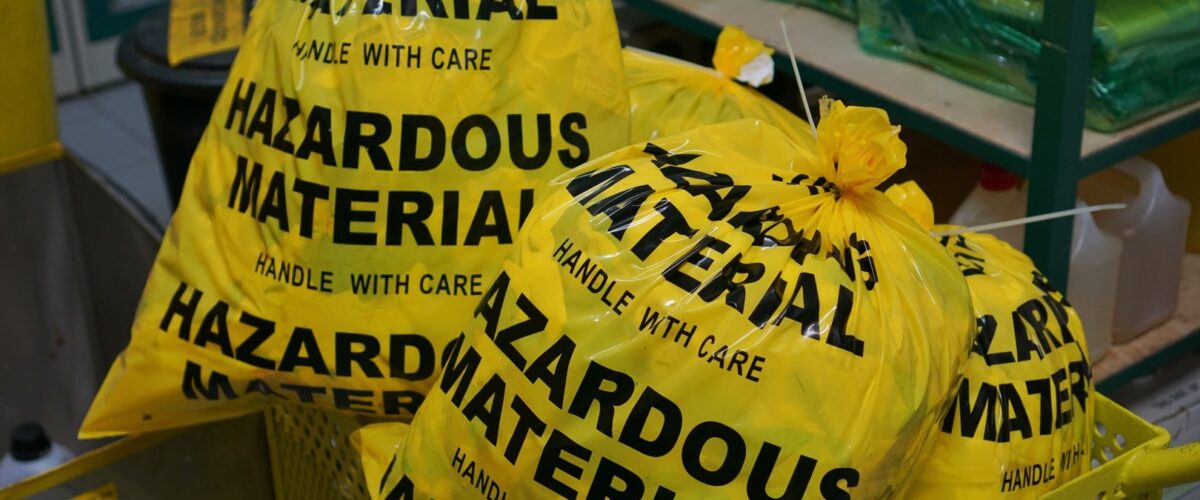- EPA (Environmental Protection Agency)
- DTSC (Department of Toxic Substances Control)
- CalEPA (California Environmental Protection Agency)
- Local CUPAs (Certified Unified Program Agencies)
Properly identifying and classifying hazardous waste is a critical compliance requirement for generators in California. Facilities must evaluate and document whether their waste streams meet federal and state criteria for hazardous wastes. This waste determination involves assessment at the point of generation and often laboratory analysis. Mishandling waste determinations can lead to violations, fines, and permitting issues. Our team of EH&S specialists can evaluate your waste streams onsite and collect samples for lab analysis when needed. CDMS will provide you with detailed hazardous waste determination reports. Let us handle this compliance requirement accurately and defensibly, saving your staff time and giving you peace of mind. State and Federal regulations identify the criteria for what is considered a Hazardous Waste. In general, waste can be hazardous based on three major criteria: CDMS can assist facilities in evaluating, determining, and documenting whether a waste is considered hazardous according to Federal or State requirements or not. Typically, this involves the evaluation of the waste at the generation point, and laboratory analysis. What determines if a waste is hazardous in California? How do I know if a waste exhibits a hazardous characteristic? What are some examples of listed hazardous wastes? Do I need to make a hazardous waste determination on all waste streams? What if I’m not sure if a waste is hazardous or not? How often do I need to review or update the determinations? What records are required for hazardous waste determinations? Can hazardous waste determinations be contracted out? Are there state-specific hazardous wastes in California? What method is used to test for the toxicity characteristic? Are Pharmaceutical wastes handled separately? Can hazardous wastes be exempted based on the amount generated? Can I treat a hazardous waste to render it non-hazardous? What are potential violations for incorrect waste determinations? Do determinations need to be made before waste transportation? How long must I keep my hazardous waste determination records? Can hazardous waste determinations be appealed? Do laboratory analysis fees count toward generator status thresholds? Can hazardous waste determinations be shared between companies? Hazardous Waste Determination
Regulatory bodies
Who needs it
Regulation reference
What our service provides:

Request a Free EHS Compliance Assessment
Wastes are hazardous if they exhibit dangerous characteristics or appear on state/federal hazardous waste lists.
Wastes must be tested at a certified lab to determine if they are ignitable, corrosive, reactive or toxic.
Common examples include certain solvents, petroleum products, plating solutions, batteries, and pesticides.
Yes, a determination is required on all solid and liquid waste streams generated at your facility.
When in doubt, assume it is hazardous and manage it accordingly until definitive determination is made.
They should be reviewed any time the process generating the waste changes significantly.
The regulation cited, testing data, personnel involved, evaluation dates, and determination basis.
Yes, environmental firms can be hired to perform the evaluations and testing. Please Contact Us to get support or request a Hazardous Waste Determination assessment. Our skilled team of EH&S specialists is ready to assist you.
Yes, California’s list of hazardous wastes includes more chemicals than the federal list.
The Toxicity Characteristic Leaching Procedure (TCLP) mimics landfill conditions.
Yes, healthcare facilities have additional regulations for handling pharmaceutical hazardous waste.
No, the hazardous waste requirements apply regardless of the quantity generated.
Yes, treatment like solidification can sometimes remove the hazardous designation.
Inaccurate determinations can lead to illegal disposal, fines, permit issues and penalties.
Yes, hazardous waste cannot be offered for transport without proper classification.
At minimum 3 years, but 5+ years is recommended.
No formal appeal process exists, but the regulatory agency can be petitioned.
No, fees for hazardous waste determination tests do not count toward generator thresholds.
No, determinations are site-specific based on individual processes generating the waste.



